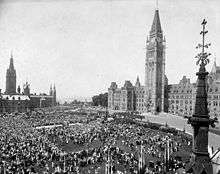Dominion Day
Dominion Day was a day commemorating the granting of Dominion status in certain countries. It was an official public holiday in Canada from 1879 to 1982, where it was celebrated on 1 July; that date is now known as Canada Day. In the Dominion of New Zealand, the anniversary of the granting of Dominion status, on 26 September, was observed as Dominion Day; it was never a public holiday.
Canada

Dominion Day (French: Fête du Dominion) was the name of the holiday commemorating the formation of Canada as a Dominion on 1 July 1867. It became an official public holiday in 1879.[1] Some Canadians were, by the early 1980s, informally referring to the holiday as "Canada Day".[2][3] Proponents argued that the name "Dominion Day" was a holdover from the British colonial era.[4] The holiday was formally renamed to Canada Day in 1982, the year the Canada Act was passed.[5]
New Zealand
._(21118908600).jpg)
A Dominion Day was occasionally celebrated in New Zealand to commemorate the anniversary of New Zealand becoming a Dominion on 26 September 1907. It was never a public holiday, although the first Dominion Day was a day off for public servants.[6] The first Dominion Day was celebrated with a parade and other festivities in the capital, Wellington. Electric lights decorated Parliament Buildings, spelling out the words "Advance New Zealand".[7] In late morning, the Prime Minister, Sir Joseph Ward read the proclamation from the main steps of Parliament Buildings. Outside of the capital, there were popular military parades in cities such as Auckland. Other places "declined the government’s invitation to be enthusiastic".[6]
Dominion Day soon "faded away as a public event" – there were occasional celebrations in the first few years after 1907, mostly in Wellington, but they were mainly formal events that did not capture the attention of the public.[8] There was no strong emotional attachment to the anniversary, because New Zealand's granting of Dominion status passed largely unnoticed as a symbolic change.[8][9] In 1907, the Otago Daily Times called the day "a finger-post in the history of this land, but it is no land-mark".[6] New Zealand historian Keith Sinclair later remarked: "… the change of title, for which there had been no demand, produced little public interest. It was largely regarded as Ward's personal show … it was merely cosmetic".[9]
Today, the Canterbury (South) anniversary day celebration is the fourth Monday in September,[10][11] corresponding to Dominion Day; the holiday is otherwise unobserved in the rest of the country. There has been support in some quarters for the day to be revived as an alternative New Zealand Day, instead of renaming Waitangi Day, New Zealand's current national day.[12]
References
- Why We Should Bring Back Dominion Day , HuffPost Canada, 1 July 2014.
- "Across Canada/Pro-Canada sign painter has brush with law". The Globe and Mail. 19 November 1977. p. 12.CS1 maint: ref=harv (link)
- Cherry, Zena (20 February 1978). "Protocol chiefs gather to discuss their trade". The Globe and Mail. p. 27.
- Sibley, Robert (September 1, 2006). "The death of 'Dominion Day'". The Ottawa Citizen. Archived from the original on November 10, 2012. Retrieved July 11, 2011.
- Matthew Hayday; Raymond B. Blake (2017). Celebrating Canada: Holidays, National Days, and the Crafting of Identities. University of Toronto Press, Scholarly Publishing Division. p. 19. ISBN 978-1-4426-2154-1.
- "The first Dominion Day". nzhistory.govt.nz. Ministry for Culture and Heritage. Retrieved 15 May 2020.
- "Parliament Buildings lit up on Dominion Day, 1907". nzhistory.govt.nz. Retrieved 17 May 2020.
- "Demise of Dominion Day". nzhistory.govt.nz. Ministry for Culture and Heritage. Retrieved 15 May 2020.
- "Becoming a dominion". nzhistory.govt.nz. Ministry for Culture and Heritage. Retrieved 15 May 2020.
- "NZ Public Holidays". publicholiday.co.nz. Retrieved 17 May 2020.
- "Public holidays and anniversary dates". New Zealand Government. Retrieved 17 May 2020.
- "Editorial: Dominion Day debate needless - National". The New Zealand Herald. Retrieved 15 January 2016.